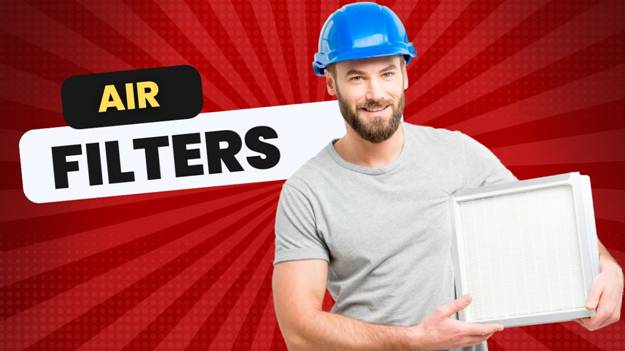Because they capture dust, allergies, and other pollutants, air filters are essential for preserving the quality of the air within buildings. To guarantee effective operation, they must be changed after they are saturated with these particles. This raises a frequent query: Can air filters be recycled? Reducing environmental effects requires knowledge of the appropriate disposal techniques and the recyclability of air filters. With an emphasis on MERV 8 air filters, this tutorial will walk you through all you need to know about recycling air filters.
Understanding Air Filters and Their Composition
Air filters are typically made of several components, including:
- Filter Media: It can depend upon polyester, fiberglass, or cotton, but most generally it organizes the filter media. This part traps dust and other particles that are present in the air as air goes through the filter.
- Frame: The frame normally consists of cardboard or metal that supports the filter media with its structure.
- Adhesives and Seals: It is these components that assemble the filter media and frame and ensure that the air only passes through the filter media and not over it.
It might be difficult to recycle air filters because of their composite composition. Prior to recycling, the various components must be separated, which isn’t always possible for most recycling facilities.
Are MERV 8 air filters recyclable?
Concerning its capacity to balance efficiency and airflow, THE CITY 8 air filters are a popular option for both home and commercial HVAC systems. They can capture dust, pollen, and mold spores, among other particles, as small as 3 to 10 microns. Like with other air filters, MERV 8 filters are difficult to recycle.
- Filter Media: The filter media in MERV 8 air filters are normally synthetic in nature and thereby difficult to recycle. These materials can include nonwoven polyester or fiberglass, which typical municipal recycling programs do not collect.
- Frame: To be more specific, the frame of MERV 8 filters is mainly made of cardboard, despite the fact that it can, in theory, be recycled. However, the frame is generally dirty due to dust and other forms of substance that reduce its value to recycling companies.
- Adhesives: The adhesives utilized for connecting the frame and the filter media are also non-recyclable materials, making it a highly challenging endeavor.
Overall, most local recycling programs find it challenging to recycle MERV 8 air filters due to their intricate structure. This does not imply that there are no possibilities for disposal; rather, it calls for a little more work and careful consideration.
Proper Disposal Methods for MERV 8 Air Filters
If recycling your MERV 8 air filters isn’t an option, there are several other disposal methods you can consider:
- Landfill Disposal: The most preferred way of disposing of the used air filters is to throw them away, mainly into the dustbin. Although this is not one of the best solutions to the problem, it is a common one as these materials are the only ones available for homeowners. Never put the filter directly into your trash bin without both sides covered in a plastic bag, as this will spread dust and allergens.
- Incineration: In some areas, waste-to-energy companies convert waste to energy through the burning of the waste material. It is not a recycling method but helps to decrease the amount of waste disposal to volume bottoms and can be more effective. This is, however, a locality-dependent solution; please consult your waste disposal agency to know if this solution is available.
- Specialized Recycling Programs: Many manufacturers and other third-party organizations provide certain branded air filter recycling programs. Such programs usually entail posting the used filters to a specific center where their parts are disassembled and recycled. Of all the options, this one is the longest and may be costly, but it is the best option for the environment.
- Reuse in Creative Ways: Despite this, people occasionally take great strides in creating other uses of air filters, though they are not very popular. For instance, the cardboard frame on which the product is assembled may be repurposed for other construction work or recycled in biodegradable compost if it is not tainted by any chemicals. That said, this should only be done when the filter is not so full of pollutants since it is thicker.
Reducing Environmental Impact with Air Filters
While proper disposal is essential, there are also ways to minimize the environmental impact of your MERV 8 air filters:
- Use reusable filters: Certain air filters can be used over and over again after cleaning, whereas others are disposable. It is to be underlined that these filters can be washed and used several times before it is necessary their substitution, thus minimizing garbage. Again, the reusable filters often have lower MERV ratings and are therefore not as efficient as the disposable filters.
- Choose High-Quality Filters: It is also important to note that premium filters may last longer than the standard ones, hence requiring replacements after some time, which is relatively less than the other ones. This also saves on the quantity of filters that one is likely to go through in a given period and thus must be embraced.
- Buy in Bulk: Refilling air filters saves on packaging cost as most of these filters come in large quantities and using genuine parts is often cheaper.
- Check Manufacturer Recycling Programs: As it was pointed out earlier in this paper, some firms have recycling programs for their filters upon their disposal. If you decide to buy some filters, you should try to find out whether the firm selling them has a take-back or recycling policy.
The Future of Air Filter Recycling
The recycling industry is always changing, and new methods and technologies are being created to increase recycling’s effectiveness and accessibility. Future air filter recycling solutions could be more widely available, and they might even include MERV 8 air filters.
Research on the creation of biodegradable filter media is one promising field. The natural breakdown of these filters would lessen the disposal’s negative environmental effects over time. Another option is to design air filters that are entirely recyclable, meaning that each component can be extracted and handled by current recycling facilities.
As customers, we can accelerate this shift by endorsing businesses that place a high priority on sustainability and by keeping up with the most recent advancements in trash management and recycling.
Conclusion
Although MERV 8 air filters cannot be recycled, there are actions you can take to minimize your environmental impact, such as understanding proper disposal methods and reducing waste. Whether you choose to buy reusable options, explore specialized recycling programs, or simply throw your filters in the trash, every effort contributes to a more sustainable future.
When considering air filters, it’s also useful to compare MERV 8 vs 11 filters. While both types effectively improve indoor air quality, MERV 11 filters offer higher efficiency by capturing smaller particles. MERV 11 filters can trap particles as small as 1 micron, compared to the MERV 8 filters’ capability of capturing particles as small as 3 microns. This increased efficiency means fewer replacements may be needed, which can reduce the overall number of filters disposed of over time.
Remember to stay informed about local recycling options and consider the environmental impact of your choices. With the right approach, you can ensure that your air filtration system not only maintains clean indoor air quality but also aligns with sustainable practices, regardless of whether you use MERV 8 or MERV 11 filters.







